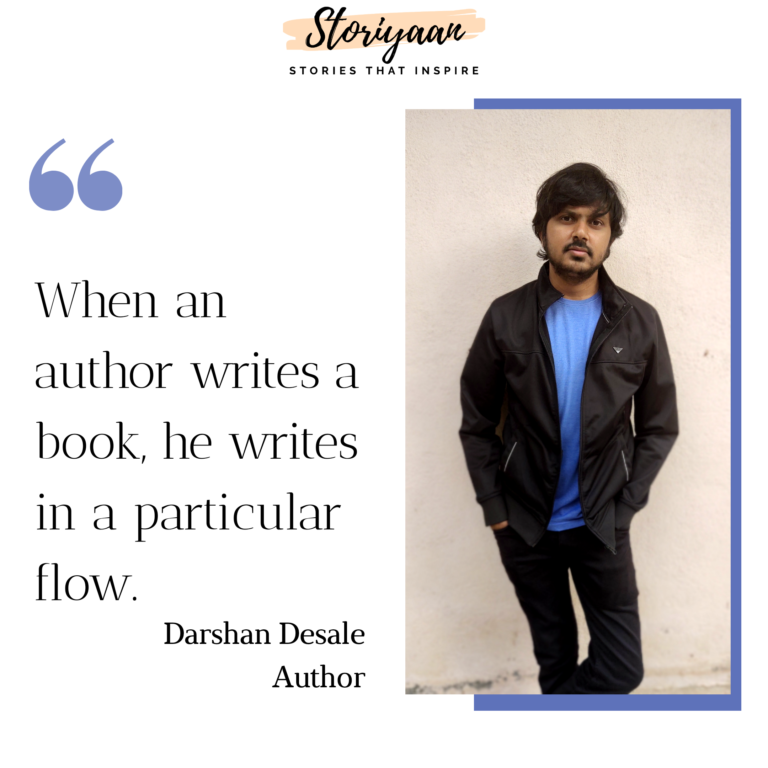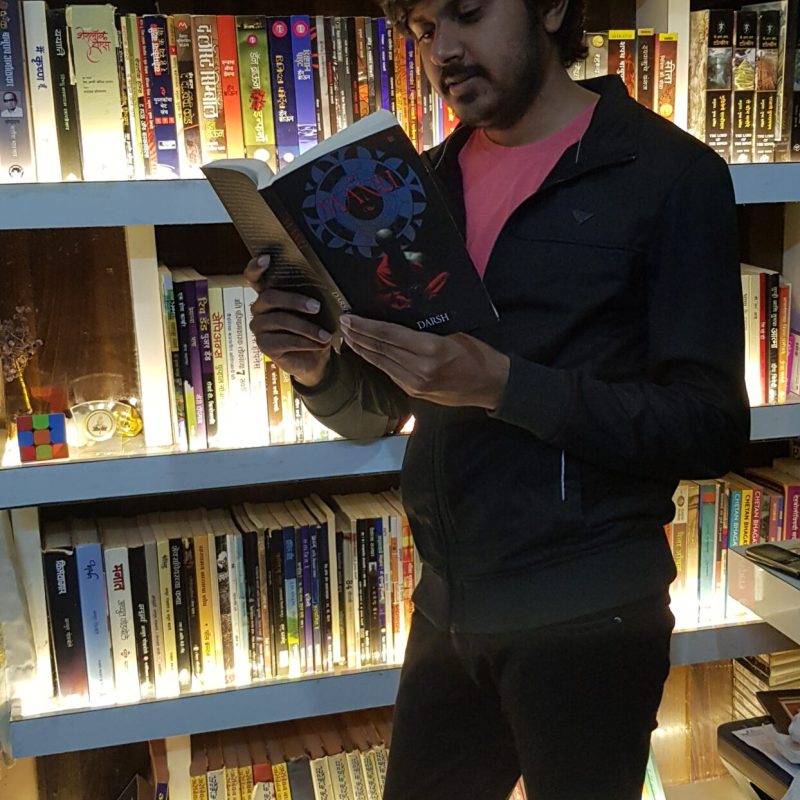Darshan Desale is a college student, pursuing animation and VFX in Pune. At the age of 20, Darshan already has a mythological tale named ‘MANU’ credited to his name. He has also written a number of Marathi audiobooks in a span of just one year, and several more are being recorded. They have gained immense popularity and appear under “most popular audiobooks in Marathi” on Storytel. Due to their popularity, many of them have been translated into English and Hindi too. Darshan Desale’s first audiobook “Zombie” was also the first audiobook about zombies in Marathi.
The young writer and music enthusiast has received a lot of acclamation for his work. Let us hear what Darshan Desale has to say in a conversation with Storiyaan. Read to know more.

Interview
Questions and answers
What is it about animation and VFX that fascinates you the most?
Being an author, not everyone understands my perspective. They perceive the idea according to their comprehension and experience. However, with the help of animation and VFX, I’m able to put on the screen exactly what I want to show without feeling fake. I can portray ideas which are difficult to put into words. It proves the saying: A picture is worth a thousand words.
Being a music lover, what is the go-to song that makes you feel better instantly?
Some retro Hindi songs make me feel better. Since I was born in the 90s era, that time was magical for me. Some songs of that era were exquisite, and some of them are always on my playlist. I have some South Indian songs on my playlist too, and they help keep me calm down, even though I do not understand the lyrics. As we know, music has no language barrier; feelings have no language.
The journey of your first book, "Manu" began when you were in the 8th grade. Can you tell us more about the conceptualization of this novel?
When I was in 8th grade, I wrote my first story, which was not a success. It had 30-40 pages, and it was a simple, mystery story that I wrote in a small notebook that kept circulating among friends. After reading my story, they gave me positive feedback, and that’s when I realized my talent. I was attracted to mysterious things, mythology, and the mysteries of the universe, and that’s where my research started. I sought answers regarding what was true, what was half-true. It increased my knowledge and curiosity about certain things. If those things didn’t attract me at that time, I might not have written ‘MANU’ today.
You have written more than ten audiobooks this year; this must have made your schedule incredibly hectic. How did you manage to write ten books in a year?
For me, it was easy since lockdown caused my college to close. I took advantage of this situation and used my time productively. I don’t use social media very much as it is very time-consuming. Once I come up with the concept, it doesn’t take me long to write. Two days is enough for me to write an audiobook. During this time, many unique concepts came into my mind, and I wrote them without wasting time.
What are some of the challenges you faced while getting your work on an esteemed platform like the storytel app?
The biggest challenge was the style of writing. I had the experience of writing novels. But the similar method cannot be used in audiobooks, so I had to change my writing style. It took a lot of hard work to capture that style and get used to it. The second challenge was writing horror stories. I’d never written horror before, and I needed to write a horror concept for audiobooks. But while writing the audiobooks, I realized I could not only write mythology effectively but also horror. It enhanced my skills, and I also got a unique identity from the Audiobooks.
Do you think the authenticity and essence of your Marathi novels get lost when it's translated to English and Hindi?
Maybe yes. When an author writes a book, he writes in a particular flow. He writes in his way, from his knowledge and experience. If you take a book from the original language written by the author, you will find a lot of things in it that will not be available in the translated one. It doesn’t contain the original spirit of the author. Though this is not always the case, I think the original is the original, and it allows you to connect with the author directly.
Can you share with us about the thought process of putting together "Zombie"?
When writing the audiobooks, I always try to write something new that listeners will find unique and intriguing. When I was in search of something new, I realized that there is no content available on zombies in Marathi. So I thought of writing something on zombies so that listeners can experience zombies for the first time in Marathi, but my journey was not easy. This is because people have already witnessed the concept of zombies in Hollywood movies. However, I gave it my best, and the audience also enjoyed my work.
What is your experience of writing books for children?
It is difficult to write stories for the children because you have to think like a child. Having said that, nothing makes me happier than receiving love from children. We all have an innocent child inside us, but as we get older, it is suppressed. One must remember that childhood is the best school and curiosity is the best teacher.
What is your process of researching before you start to pen down your thoughts?
I do not need much research to write fantasy and fiction. In fantasy, your imagination is at play. If you want to write something meaningful, like mythology, science fiction, or even horror, then you need research. To conduct research, you first have to remove tags and consider both sides of the coin. Only then will you find the whole truth. Some concepts are so complicated that they are not understood quickly, or they seem unbelievable. Even so, I have taken a minor risk in my book Manu. You don’t have to conduct research every time; writing must be done spontaneously.
What was your first thought when your friends urged you to write your first book?
I was unsure because I wanted to put a lot of different and complex topics together in one book. Along with mythology, I wanted to integrate science fiction, fantasy, folklore, philosophy, fairy tales, and also my theory. Still, I could not find the perfect concept in which all my thoughts would fit perfectly. However, I never gave up, and two years later, Manu was created.
It's evident that you encourage criticism from your readers on your books, how do you distinguish between genuine feedback and trolls?
Those who want to give genuine feedback, they honestly convey what they liked or didn’t like, or what they didn’t understand. Even before the book was published, I had decided that this book was not for everyone. It is difficult to understand some concepts from the book. So, those who didn’t understand them will misinterpret it. If there is more genuine feedback than trolls, then why should I pay attention to trolls?
Once you come up with an idea for a novel, what is the next step?
You have an idea only when you deserve it. So why wait for the next step? Put your ideas on paper immediately. The more you write, the better your writing will be, and the plot will come to you as you write. The rest of the story is suspense for the author, too, that’s the real fun of writing.
Quick 5
a. Dream travel destination: The parallel universe or on the other planet where alien species exist.
b. Writing or reading: Reading
c. Horror or Mythology: Mythology
d. All-time favorite poet: Kusumagraj (Vishnu Vaman Shirwadkar)
e. Paperback or audiobook: Paperback

